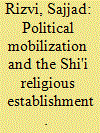| Srl | Item |
| 1 |
ID:
125040


|
|
|
|
|
| Publication |
2013.
|
| Summary/Abstract |
Despite its relative absence from much of the literature on politics in the Pacific region, religiosity is an assumed and often unchallenged component of political life. Drawing from more than 100 in-depth biographical interviews with politicians, around 40 published life histories and other publicly available material, this article uses Pierre Bourdieu's concept of 'habitus' to explore how politicians see the role of faith and religious association contributing to their public profile, election campaigning, representative and legislative functions, and 'inner' life. It advances two arguments: firstly, that ideal analytic distinctions like state, society and religion become problematic in the Pacific Islands where political leaders tend to occupy multiple roles and assume overlapping identities; and, secondly, that despite the overwhelming religiosity seemingly apparent in public rhetoric, secularization is an effervescent narrative across the region with politicians vocal protagonists on all sides of this debate.
|
|
|
|
|
|
|
|
|
|
|
|
|
|
|
|
| 2 |
ID:
099900


|
|
|
|
|
| Publication |
2010.
|
| Summary/Abstract |
Since the fall of the Ba'athist regime in 2003, the Shi'i religious establishment in Iraq has come to the fore as a signifcant political force, intervening, guiding, supporting and opposing various types of developments. Its prominence has been directly related to the realization that the Shi'a constitute an absolute majority in Iraq and hence would have the primary influence in a democratic state. Alongside the recognition of its importance, some analysts tend to assume that the Shi'a are more inclined than others in Iraq to follow their religious and cultural leadership. This article attempts to clarify a number of issues pertaining to the actual attitudes and relationships between the marja'iyya and politics in Iraq. First, it examines three important approaches to an activist understanding of the role of the marja'iyya in politics and comments on the actual political movements that arise from them. Second, the article analyzes the role of the paramount fgure in the marja'iyya in Najaf, Ayatollah Ali Sistani and his attitudes towards politics and some of his active interventions in Iraqi politics. Finally, it comments on outstanding problems and failures within the leadership of Shi'i politics and the limitations of the marja'iyya in promoting democratic and civic politics. Any political actors in contemporary Iraq must take cognizance of the role of the marja'iyya but also account for the deficits that need to be overcome to propel Iraq beyond a compromise of ethnic and confessional affliations.
|
|
|
|
|
|
|
|
|
|
|
|
|
|
|
|